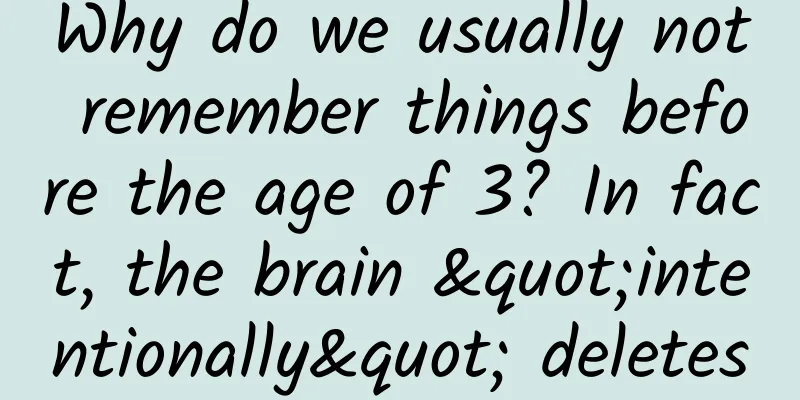Why do we usually not remember things before the age of 3? In fact, the brain "intentionally" deletes

|
This is the 5327th article of Da Yi Xiao Hu Have you ever had this experience? At a family gathering, the elders asked you with a smile: "Baby, do you remember the fun things you did when you were a child? For example, you used a puppy as a toy, or painted your face with lipstick?" And you can only shake your head blankly, muttering in your heart: "I really don't remember those things!" In fact, this is not just your problem. Almost everyone has a vague memory before the age of 3. The brain seems to intentionally "delete" this early memory. What kind of scientific secret is hidden behind this? Today, let us unveil the mystery of "childhood amnesia". Childhood fog linked to brain development Psychologists call the phenomenon that humans cannot remember things before the age of 2 to 3, and the memory is incoherent between the ages of 3 and 7 "childhood amnesia." Although each person's specific situation is different, almost everyone is more or less affected by this phenomenon. Think back, have you ever remembered anything about your childhood when you sneezed and noodles came out of your nose, or when you were scared by your mother's face mask and screamed? Even if your family members tell you about it with photos, you can only answer blankly: "Really? I don't remember!" To solve this mystery, we must first get to know a "superstar" in the brain - the hippocampus. This delicate structure located on the inner side of the temporal lobe of the brain is named after its resemblance to the marine creature seahorse. It is a key area for memory formation and storage. However, in infancy, the hippocampus is like a fledgling "intern", not mature enough to handle the task of long-term memory. It is not until around the age of 4 that the hippocampus gradually "becomes regular" and begins to steadily record our life stories. In addition to the hippocampus, our visual system is also lagging behind. Newborn babies have extremely poor vision, and the world looks like a blurry ink painting to them. As they grow older, their vision gradually improves, and colors and details slowly become clearer. The formation of memory depends largely on visual information. Therefore, in infancy and childhood when visual development is not perfect, our memories naturally appear fragmented. Another factor that cannot be ignored is the formation of self-awareness. Before the age of one, we do not have a clear concept of "self", cannot distinguish between ourselves and others, and do not understand "past" and "future". This lack of self-awareness makes it difficult for us to transform our experiences into a series of timelines and milestones in real life, thereby establishing a retrieval structure that is conducive to recall. The Art of Forgetting You may ask, if these memories are so precious, why does the brain want to forget them? This is actually a self-protection mechanism of the brain. From birth to about 2 years old, the brain is like a sponge, madly absorbing all kinds of information from the outside world. This information is stored in the brain in the form of synapses, gradually forming a dense "memory network". However, if all this information is retained without screening, the brain will become like an overloaded computer, running slowly or even crashing. Forgetting the past is to make the brain work better. Memory relies not only on the number of neurons, but also on the connections between neurons. The synapses in the brain first develop rapidly, reaching their peak at around 2 years old, and then begin to simplify, gradually clearing out those unimportant and infrequently used memories. In this way, the brain becomes more concise and efficient, making room for new learning and memory. You know, our brains have amazing plasticity, especially when we are young. Unforgotten love and growth Although the specific events before the age of 3 may have been forgotten, the feelings and impacts left by those experiences are deeply imprinted in our hearts and minds. Do you still remember the joy you felt when you first learned to walk and ride a bike? Although the specific images are blurred, the sense of accomplishment accompanies us as we grow up. These skills are stored in the cerebellum and basal ganglia and become part of our bodies. The close interactions with parents in childhood, the fear and comfort when injured, these emotional experiences are retained in emotional centers such as the amygdala, shaping our interpersonal relationships, emotional regulation, and ability to cope with stress. In getting along with our family, we gradually form our own cognition, including personality, interests, values, etc. These cognitions become part of our personality and guide the direction of our lives. Memories may drift away with the wind, but love is like a bright light, illuminating the way forward and giving us strength and warmth. Perhaps one day in the future, when you become a parent and start taking care of your own baby, those forgotten times will suddenly come to mind, allowing you to deeply appreciate the deep love and courage. Author: The First Hospital of Shanxi Medical University Neurosurgery Wang Mingyu |
Recommend
Look, the first message sent by humans to the universe is the real broadcast era
Arecibo's first active signal sent into space...
It’s time to spend ten minutes clarifying the definition of product operations
Product operation is the process of attracting a ...
How does a popular video game become popular?
The most direct criterion for evaluating the qual...
iPhone 6S parameters exposed: equipped with 12 million pixel camera
Recently, news reports about the exposure of vari...
Appointment with the Starry Sky|Look! The first "star" of 2022
This article is reproduced from Xinhua News Agenc...
Baidu and Volkswagen have reached a strategic cooperation and the research and development project around autonomous parking has been launched
On November 2, the second Baidu Apollo Council wa...
Watsons crosses borders to attract fans, teach you how to play fan marketing
In brand marketing , fans are not only high-quali...
Before the official release of Android 5.0, 4.4 KitKat finally surpassed 4.1 Jelly Bea
[[122322]] Google updated the Android version dat...
More practical APP ranking optimization methods and techniques
In recent years, it is not uncommon to see apps t...
Yiwei Liu, "Corporate Growth Map: An Operational Guide for Sustainable Corporate Growth"
Liu Yiwei's "Enterprise Growth Map: An O...
When the iPhone is no longer magical, frequent personnel changes reveal Apple's difficult choices
Without waiting for too much speculation from the...
When the weather gets cold, why does your phone suddenly run out of battery or even shut down automatically?
Winter always brings infinite beauty, but also so...
Rebuilding the ceiling of Mini LED technology! TCL releases major new technologies such as Vientiane partition
On December 16, the 2024 TCL QD-Mini LED new tech...
The Taklimakan Desert is getting wetter! Why is rainfall in southern Xinjiang becoming more frequent?
On August 27, the topic #新疆塔克拉玛干漠发Flood# ranked f...
A diver was bitten by a moray eel underwater and his blood turned green...
Tim Powell is a diving enthusiast. In 2010, he up...









